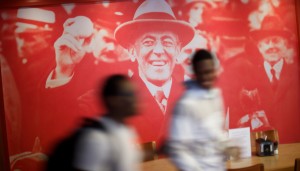
virulent racist, even by the standards of the day.
A group of Princeton students, who go by the name the Black Justice League, are trying to change the perception of Wilson by acknowledging his racist past. They are campaigning for the school to rename the Woodrow Wilson School of Public and International Affairs and the residential complex known as Wilson College.

Princeton students sit-in at President Eisgruber’s office on Nov. 19. (Julio Cortez/Associated Press)
The group has presented a list of demands to the university administration.
“We don’t want Woodrow Wilson’s legacy to be erased,” said Wilglory Tanjong, a Princeton student who is originally from Cameroon, in an interview with The New York Times. “We think it is extremely important that we understand our history of this campus. But we think that you can definitely understand your history without idolizing or turning Wilson into some kind of god, which is essentially what they’ve done.”
Wilson, who was born in Virginia, the heart of the Confederacy, has a disturbing racial past. Here are some racial issues he has been associated with:
- While he was president of Princeton from 1902 to 1910, no Black students were admitted to the school. Wilson wrote, “The whole temper and tradition of the place are such that no Negro has ever applied.”
- In 1915, Wilson attended a White House screening of Birth of a Nation, a movie that casts the Ku Klux Klan as heroes. The movie depicts white actors in blackface playing Black men who lust after and attempt to rape white women. The white women are rescued by heroic Klansmen. Wilson also talked of a “great Ku Klux Klan” that had disposed of the “the intolerable burden of governments sustained by the votes of ignorant Negroes.”
- Under Wilson, the United States invaded Haiti in 1915, beginning an occupation that would last until 1934. According to The New Yorker, one of the first actions after the invasion was to move Haiti’s foreign reserves ($500,000) to the U.S. and rewrite its constitution to give foreigners land-owning rights. During the 19-year long occupation, 15,000 Haitians were killed. Marine Corps Gen. Smedley Butler was so disgusted by what he saw during the invasion of Haiti, and other Latin American countries, he wrote War is a Racket. He said during his years in the military, he had served as “muscle” for American corporate interests.
- When Wilson became president in 1913, he stocked his cabinet with segregationists. He also began to roll back gains Blacks had made since Reconstruction, especially in the areas of federal civil service, where several Black employees were demoted and segregation was enforced. Wilson didn’t see segregation as a bad thing. “Segregation is not humiliating, but a benefit, and ought to be so regarded by you,” he said in a meeting with civil rights leaders.
Gordon J. Davis said that while history has cast Wilson as a progressive and international statesman, some Black people don’t have fond memories of him.
Davis said many Black workers, like his paternal grandfather John Abraham Davis, were adversely affected by Wilson’s policies. Davis’ grandfather was able to rise to a mid-level management position in the federal government. But after Wilson came into office, he was demoted and shuttled around to several departments, finally ending up as a messenger for the War Department. This reversal of fortune caused his grandfather to lose the family farm in 1914.
“My grandfather died before I was born, but I have learned much about his struggle — and that of other black civil servants in the federal government — from his personnel file,” said Davis in a New York Times editorial. “What is most striking is his sense of humiliation; after all, he had spent his career in a time and place where, whatever was happening in the South, African-Americans were able to get ahead. And then, suddenly, with Wilson’s election, that all changed.”


